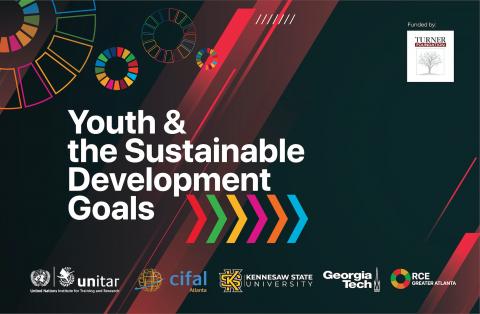
UNITAR Online Catalogue
Youth & the Sustainable Development Goals

Personas
Kennesaw State University, Georgia Institute of Technology, RCE Greater Atlanta, Turner Foundation, SCARP, Cox Enterprises, Southface, siemens, The Ray, Delta Airlines, Center for Sustainable Communities, Coca Cola, ARCHI, Anthem, Atlanta Food Forest, Feeding America, CareerRise, Chick-fil-A
Antecedentes
The world is home to the largest generation in history of young people between the ages of 15 and 24 years, 1.8 billion. Close to 90 per cent of them live in developing countries, where they constitute a large proportion of the population (UN Youth Strategy).
Connected to each other like never before and facing incredible challenges, young people want to and already contribute to the resilience of their communities, proposing innovative solutions, driving social progress and inspiring political change, in urban as well as rural contexts. Young people constitute a tremendous and essential asset worth investing in, opening the door to an unparalleled multiplier effect.
UNITAR and CIFAL Atlanta in collaboration with the Georgia Institute of Technology’s Serve Learn and Sustain Center, and the Regional Centre of Expertise on Education for Sustainable Development (RCE) Greater Atlanta are offering this e-Learning Programme and will host a conference to educate young individuals in identifying social, economic, and ecological sustainability needs of RCE member communities, as well as to teach them skills for collaborating with diverse stakeholders to create and implement sustainable development action projects.
Recognizing that young people play an important and positive role in the realization of sustainable development, the Turner Foundation awarded a grant to develop and deliver this training programme.
Objetivos del aprendizaje
By the conclusion of the course, students will be able to:
- Describe and explain the SDGs and targets
- Discuss the global progress of specific SDGs 1, 2, 3, 4, 9, 11 and 13 and recognize how these seven SDGs are being implemented in the Great Atlanta region
- Identify social, economic, and ecological sustainability needs of RCE member communities
- Explain and describe how each SDG is linked to environmental justice
- Design concrete actions that lead to collaboration with diverse stakeholders to create and implement action projects
- Create a project to raise awareness about and address at least one of these SDGs in their local community *Optional*
Contenido y estructura
Content
Course Structure: 8 Modules
- Module 1 – Introduction to The 2030 Agenda for Sustainable Development
- Modules 2-8 – SDGs 1, 2, 3, 4, 9, 11, 13
- Modules 2-8 will cover the following topics: Introduction & Explanation of SDGs, Targets & Indicators, Progress of the Goals in 2019, Challenges, SDGs In the Community, & Further Resources
- Conclusion & Optional Community Project
Methodology:
- Each module includes interactive content including voiced overview at the beginning of the module, animation, quizzes, pop-up questions
- Each module incorporates videos, links, and articles
- Each module ends with a comprehension quiz
Metodología
This is an online course comprised of interactive content, including voiced overview at the beginning of the module, animation, quizzes, pop-up questions. Each module ends with a comprehension quiz.
Público objetivo
1) Youth Network of the RCE Greater Atlanta comprised of students from many institutions of higher education from the Greater Atlanta area including:
- Agnes Scott College
- Emory University
- Kennesaw State University
- Georgia State University
- Georgia Institute of Technology
- Spelman College
- University of Georgia
- Morehouse College
- Clark Atlanta University
2) Primarily college students (Youth 18-25)
Información adicional
This course is designed in a way that it can be reasonably completed in 4-6 weeks. Approximately 16 hours to complete with a suggested 2-4 hours/week schedule. However, students who are not completing for a specific course can take however much time they need.